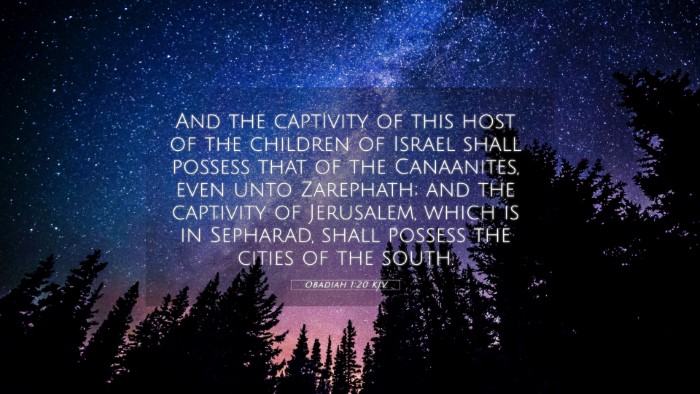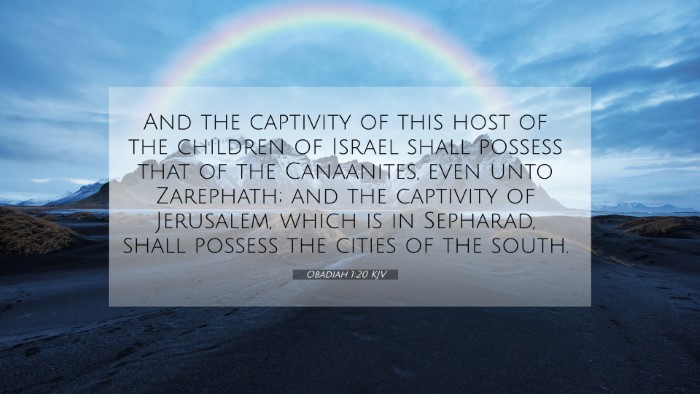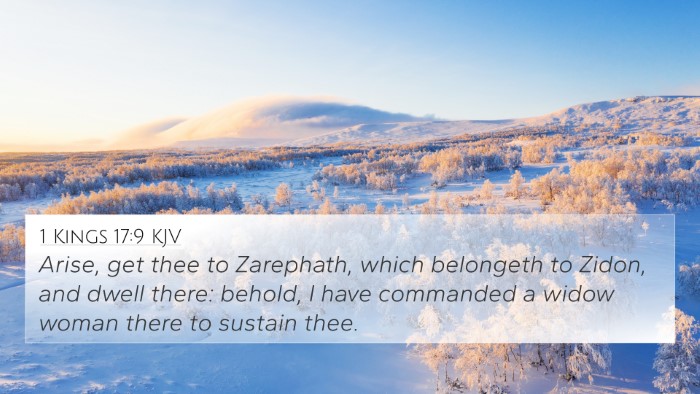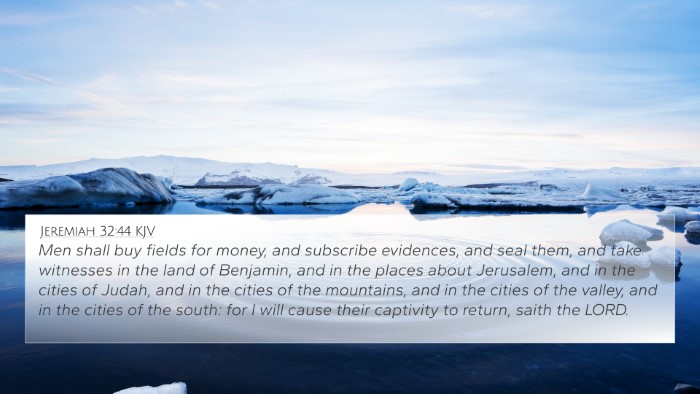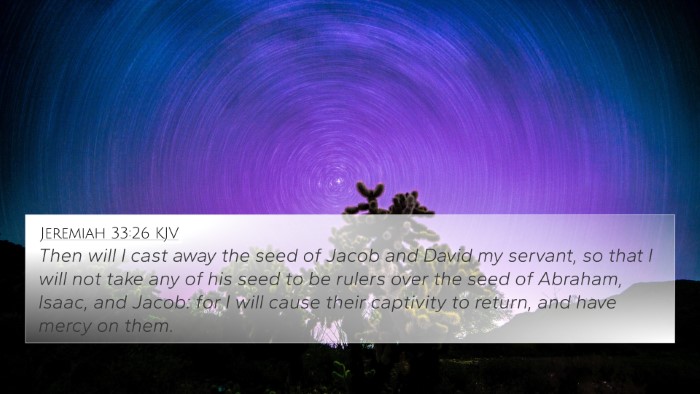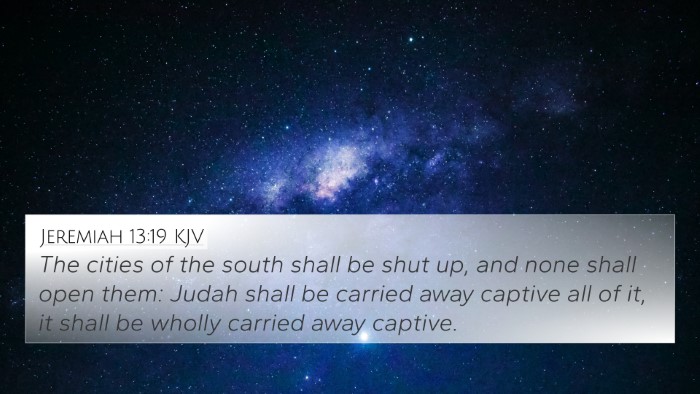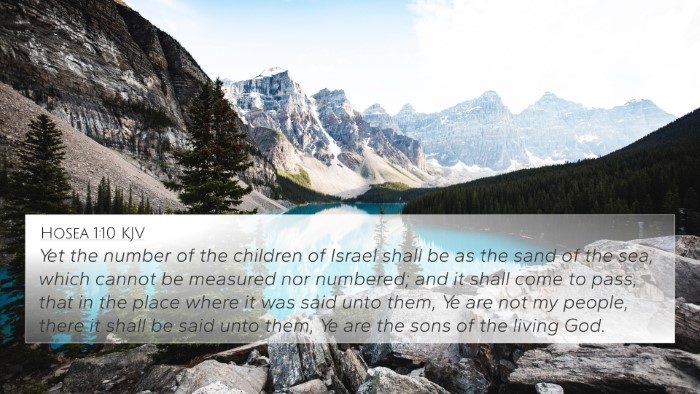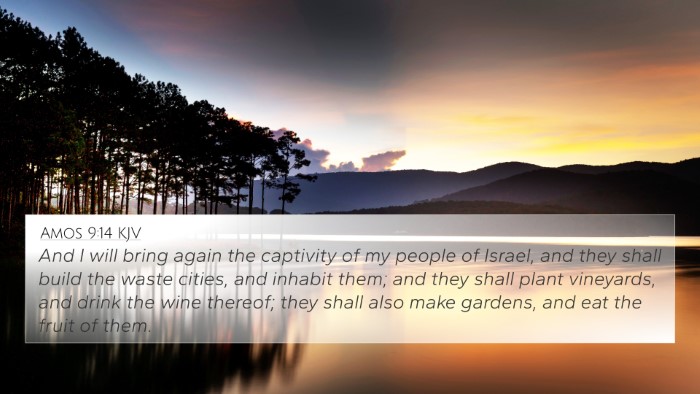Understanding Obadiah 1:20
Obadiah 1:20 states, "And the captives of this host of the children of Israel shall possess that of the Canaanites, even unto Zarephath; and the captives of Jerusalem, which is in Sepharad, shall possess the cities of the south."
This verse encapsulates the theme of restoration and reclamation. It signifies the hope that the exiles of Israel will return and reclaim their ancestral territories. The mention of Zarephath and Sepharad emphasizes the geographic and cultural dimensions of this restoration.
Commentary Insights
-
Matthew Henry:
Henry notes that this prophecy is not only about the physical return of the Israelites but also about the spiritual rejuvenation of God's people. The captives are to regain what was taken from them, illustrating God's fidelity to His covenant.
-
Albert Barnes:
Barnes highlights the historical context of the verse, linking it to the aftermath of Israel's captivity. He interprets Sepharad as a symbol of the broad dispersion of the Jews and their eventual return, pointing to the inclusivity of God's promise to restore all of Israel, wherever they may be scattered.
-
Adam Clarke:
Clarke provides additional cultural insights, identifying Zarephath as a Phoenician city, clarified as a place that shows the breadth of God's promise reaching beyond traditional Israelite boundaries. This indicates that God’s salvation extends to all nations.
Bible Verse Cross-References
To gain a deeper understanding of Obadiah 1:20, we can reference other scriptures that share similar themes of restoration, exile, and divine promise. Here are some cross-references:
- Isaiah 11:11-12: This discusses the Lord recovering the remnant of His people from various nations, echoing the theme of restoration.
- Jeremiah 30:3: A prophecy about the return of Israel to their homeland, showing God's intention to restore His people.
- Ezekiel 36:24-26: This passage emphasizes God bringing the Israelites back to their land and renewing them spiritually.
- Amos 9:14: Speaks of restoring the fortunes of Israel and resettling them in their own land.
- Zephaniah 2:7: Mentions how the remnant of God’s people will inherit the land, pointing to a future restoration.
- Romans 11:25-26: The Apostle Paul discusses the fullness of the Gentiles coming in and Israel's ultimate restoration.
- Psalms 126:1-4: Expresses joy and thanksgiving for the restoration experienced by Israel.
Thematic Connections Between Bible Verses
The themes of exile and restoration in Obadiah 1:20 resonate deeply throughout other scriptural texts, illustrating a consistent narrative about God’s faithfulness despite circumstances. The connections formed by linking Bible scriptures provide greater insight into God's overarching plan of redemption.
In exploring these connections, one may utilize various tools for Bible cross-referencing. This includes:
- Bible concordance for identifying keywords related to themes of restoration.
- Bible cross-reference guide to navigate related scriptures that demonstrate God’s promises.
- Cross-reference Bible study methods to delve into deeper analytical comparisons.
- Bible reference resources that provide contextual insights into the verses.
- Bible chain references that link together multiple scriptures around central themes.
How to Use Bible Cross-References
By understanding how to find cross-references in the Bible, one can enhance their study and grasp the connections between both the Old and New Testaments. This involves:
- Identifying connections through keywords or phrases that appear in multiple passages.
- Understanding the thematic elements that link verses across different books.
- Comparative studies of Pauline epistles with prophetic writings to view the consistency in messages.
- Examining links between the Prophets and Apostolic teachings for comprehensive understanding.
Conclusion: Interpreting Biblical Themes through Cross-References
The interconnectedness of scripture enhances our understanding of individual verses like Obadiah 1:20. By cross-referencing themes, patterns, and prophecies, we unravel a fuller picture of God’s Word and its application to our lives today.
In summary, study and reflection on verses and their connections can greatly enrich one’s faith journey, teaching us about restoration and the nature of God's promises.

